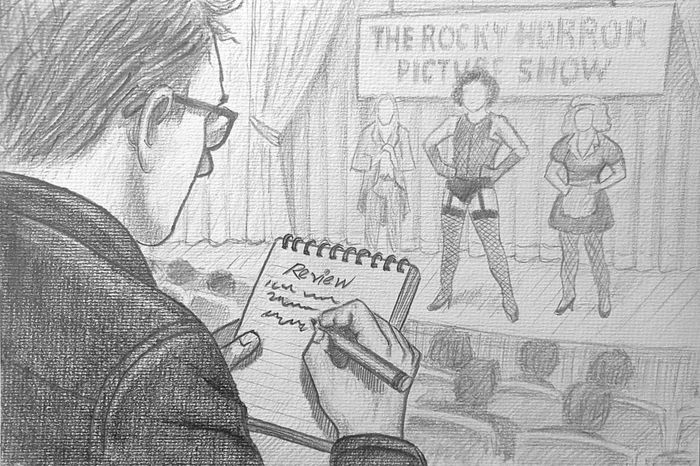The murkiness of Bathwater
Alex Brian talks to the creators behind this sold out surrealist show

Hebrew Language and Liturgy Coach. Prop Mermaid Paintings Maker. Bathwater’s production list offers an intriguing glimpse into the murky and surreal world of Sam Asher Misan’s debut play. Directed by Eva Cotton, the sold-out show follows a painter called Avi (Kiko Gomersall) who fled home the week before his Bar Mitzvah. Returning years later in search of a loan, he finds his sister married into Orthodoxy and a faith he no longer recognises woven into the walls. Having previewed at Queens’ College’s Cauldron of Bats in January, the play will receive its full debut performance at Fitzpatrick Hall later this week.
Before it was a play, it was a novel. “I’d always written as a kid, primarily short stories and what I thought were books,” Sam recalls wryly, “but I’d never really written a play”. Only when applying to the Royal Court Writers’ Group did Sam turn a chapter of Bathwater into a scene. “We had a Royal Court resident playwright who ran these master classes once a week for six weeks, and then we’d do six weeks of our own writing,” Sam explains. “All of us were working on one play, and then we submitted them afterwards and got feedback.”
“I’d always written as a kid … but I’d never really written a play”
Through this process, an uncomfortable truth surfaced: maybe Bathwater was never a novel at all? “It was almost like I’d tricked myself into journaling, because through the fictionalised element of writing prose, I was able to get thoughts down that I wouldn’t have allowed myself to otherwise,” Sam offers pensively. The finished script retains the fragmented quality of a journal, though it is much less autobiographical than the original novel.
Enter Eva Cotton, who learned about the play at a dinner party: “It all felt wonderfully reflective of the industry and the practice of forging connections via just chatting about people’s work”. The British theatre company Complicité is a major inspiration for Eva, who had been craving a script which suited their fusion of projections, physical theatre, and live as well as recorded sound. Bathwater fit the bill. “Sam’s script is so rich in symbolism, it’s full of quite separate, definable images,” Eva explains. “We had to max out the visual element of theatre in order to make that sing.”
Hence, the pair led workshops where artists produced the paintings which would appear in the play’s art therapy scenes. Oscar Pickett-Prieto also crafted a tryptic mermaid, which remains forever on stage, its absent face forming a key part of Bathwater’s central mystery. Meanwhile, Fifi Gilani curated a shadow-puppet stop motion animation for the climax. “We wanted to depict a diasporic Jewish family in a way that wasn’t reducing elements of its identity to make it legible to non-Jewish audiences,” Sam asserts. Here too visuals play a role, with projections combining the scripts of the numerous languages the family speaks. By not translating passages in French, Hebrew, Arabic and Yiddish, the show places audiences in Avi’s position of returning to a “foreign land”.
“We wanted to depict a diasporic Jewish family in a way that wasn’t reducing elements of its identity”
Even more important than the visuals are the musical elements, which Eva oversaw alongside her directorial role. The script contains lines from Mitski’s Pearl Diver, which led Eva to explore merging the secular tunes Avi adores with the liturgical music he returns home to. “In the last few years, I’ve started playing klezmer as a way of reconnecting with my very unreligious Jewish heritage,” Eva discloses. Oral tradition thus became a key theme, thanks to a recurring melody sung differently by each generation. There’s even a full choir: vital for the momentous Bar Mitzvah climax.
Sam praises Eva’s ability to align her sound design with the actors’ movements, to make them “breathe together”. Physical theatre became a much larger part of the play than expected, as warm-up exercises evolved into fully-fledged scenes. “It pulls the later moments of surrealism closer to the beginning of the play,” Sam observes enigmatically, “and gives characters who might not have had the spotlight the time to express their physicality”.
“Physical theatre became a much larger part of the play than expected”
Each moment of surrealism is triggered by an event. “That event might be in the past, it might be in the future, but it jogs the characters out of their current state and into a heightened, surreal one,” Sam explains. His goal was to make the early dialogue as naturalistic as possible so that, as the characters unravel and their words become more poetic, the difference is stark without the need for lavish language.
Instead, the poeticism derives from lasting images – of hair, of mermaids and of bathwater. Ask Sam what these mean and you will get a cryptic answer. “I’m hesitant to explain too much,” he pauses, gazing into space: “Fundamentally, it’s about the stories we tell ourselves to survive.” Will these stories become clear to those lucky enough to have secured tickets? Or is this ultimately a play about murkiness, mystery and forgotten entanglements?
Bathwater runs at The Fitzpatrick Hall’s Black Box Theatre from Thursday 6th November – Saturday 8th at 7:30 pm.
 News / Colleges charge different rents for the same Castle Street accommodation2 March 2026
News / Colleges charge different rents for the same Castle Street accommodation2 March 2026 News / King’s hosts open iftar for Ramadan3 March 2026
News / King’s hosts open iftar for Ramadan3 March 2026 Theatre / Lunatics and leisure centres 4 March 2026
Theatre / Lunatics and leisure centres 4 March 2026 News / Angela Merkel among Cambridge honorary degree nominees27 February 2026
News / Angela Merkel among Cambridge honorary degree nominees27 February 2026 News / News in Brief: waterworks, wine woes, and workplace wins 1 March 2026
News / News in Brief: waterworks, wine woes, and workplace wins 1 March 2026








